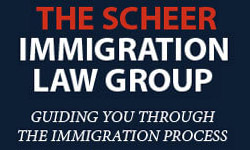Eligibility Requirements for Family-Based Immigration in New Jersey
if you are reading this, it is likely because you or a loved one is considering family-based immigration in New Jersey. Navigating the immigration process can feel overwhelming, especially when it comes to keeping track of deadlines, requirements, and paperwork. At The Scheer Immigration Law Group, we understand how confusing and stressful this situation can be, and we want you to know that we are here to help. Our team is compassionate about your concerns, and we are committed to guiding you through every step of the family-based immigration process, ensuring the best possible outcome for your case.
What is Family-Based Immigration?
Family-based immigration allows U.S. citizens and lawful permanent residents to sponsor certain relatives for a visa or green card to come and live in the United States. This process plays a crucial role in helping families reunite, as it enables qualified relatives to join their loved ones in the U.S. The relationships covered under family-based immigration include spouses, children, parents, and siblings, each with specific eligibility criteria.
For those applying in New Jersey, it is important to understand the legal requirements, so you can ensure the application is completed correctly and submitted on time. The process may seem complicated, but by breaking it down and understanding the key components, you will be better equipped to move forward confidently.
Key Family-Based Immigration Categories
There are several different categories under which a family member may be eligible for immigration to the U.S. The two main categories are immediate relatives and family preference categories. Immediate relatives are close family members of U.S. citizens, and they are not subject to annual caps on visas, which means they may experience faster processing times. These immediate relatives include:
Spouses of U.S. citizens
Unmarried children under 21 years of age of U.S. citizens
Parents of U.S. citizens (if the U.S. citizen is at least 21 years old)
In addition to immediate relatives, there are also family preference categories, which include other family members such as adult children and siblings of U.S. citizens, as well as spouses and children of lawful permanent residents. These categories are subject to numerical limits, meaning there is a waiting list for visas depending on the specific family relationship.
Attorney Susan W. Scheer attended Douglass College at Rutgers University and received her B.A. in 1974. She attended Georgetown University to get her M.A.T. in 1977 and went on to receive her J.D. from Georgetown as well in 1982. Susan is admitted to practice in New Jersey and before the United States Supreme Court.
Susan speaks Spanish, French, Hebrew, and Portuguese.
Eligibility for Family-Based Immigration in New Jersey
The first step in ensuring eligibility for family-based immigration is determining whether the family relationship qualifies under U.S. immigration law. This is determined by the petitioning U.S. citizen or lawful permanent resident, who acts as the sponsor for their relative.
For U.S. citizens, the eligibility requirements are more expansive, as they can sponsor immediate relatives as well as other family members, such as adult children and siblings. On the other hand, lawful permanent residents can sponsor spouses and unmarried children, but they are limited to these two categories.
In either case, the petitioner must meet certain financial requirements. They must demonstrate that they have enough income or assets to support the family member coming to the U.S. This requirement is in place to ensure that the immigrant does not become a public charge, or dependent on government assistance, after entering the country. The petitioner will need to provide evidence of their income, usually in the form of tax returns, pay stubs, or other financial documents.
Filing a Petition for a Family Member
Once you have established that you meet the eligibility requirements for family-based immigration, the next step is filing a petition for your relative. This is done through the U.S. Citizenship and Immigration Services (USCIS), which oversees the immigration process. The petitioner will file a Form I-130, Petition for Alien Relative, to begin the process.
The I-130 petition is used to prove the familial relationship between the petitioner and the family member. Depending on the category of your family member, they may need to wait for a visa to become available. Immediate relatives of U.S. citizens typically do not face long waits, as there is no cap on the number of visas available for this category. However, for family preference categories, the waiting period can be several years depending on the relationship and country of origin.
Once the petition is approved, your relative may then apply for an immigrant visa at a U.S. consulate or embassy if they are outside of the United States. If they are already in the U.S., they may apply for a green card through the adjustment of status process without leaving the country.
Documenting Your Family-Based Immigration Case
Throughout the process, there will be numerous documents required to prove your eligibility for family-based immigration. These documents include birth certificates, marriage certificates, and proof of U.S. citizenship or permanent resident status of the petitioner. It is essential that these documents are accurate and properly translated if they are in a language other than English.
If you or your family member are applying for a visa or adjustment of status, additional documentation may be required, such as police clearances, medical exams, and other forms. The paperwork can be complicated, and failing to submit the right documents can delay the process or even result in a denial.



 From the initial consultation to the successful resolution of my case, their commitment to excellence was evident. Scheer Immigration Law Group not only provided legal expertise but also exhibited a genuine concern for my well-being throughout the journey.
From the initial consultation to the successful resolution of my case, their commitment to excellence was evident. Scheer Immigration Law Group not only provided legal expertise but also exhibited a genuine concern for my well-being throughout the journey.




